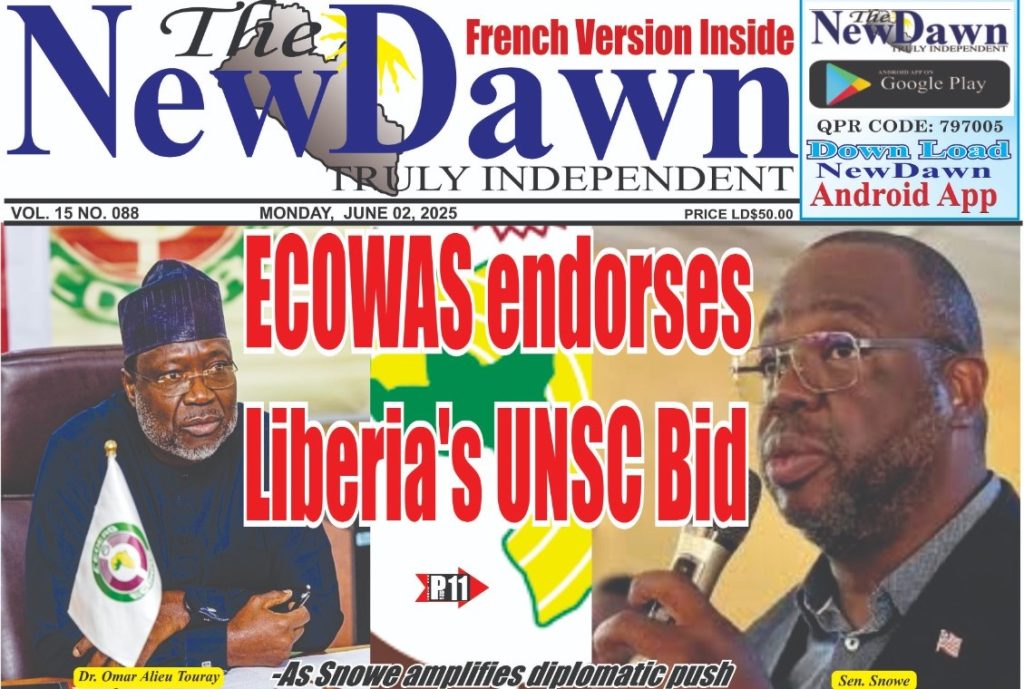Liberia’s pursuit of a non-permanent seat on the United Nations Security Council (UNSC) has received a significant boost with the unanimous endorsement from the Economic Community of West African States (ECOWAS). This regional backing, secured through the diplomatic efforts of Senator Edwin Melvin Snowe, head of Liberia’s delegation to the ECOWAS Parliament, represents a crucial step in Liberia’s campaign, solidifying its position as the region’s preferred candidate. The ECOWAS endorsement not only strengthens Liberia’s bid but also underscores the regional bloc’s confidence in Liberia’s ability to represent West African interests on the global stage. Senator Snowe’s engagement with ECOWAS, particularly his advocacy for continued dialogue with member states considering withdrawal, highlights Liberia’s commitment to regional stability and unity.
Beyond the UNSC bid, Senator Snowe acknowledged ECOWAS’s role in mediating internal political tensions within Liberia, specifically referencing the organization’s intervention in resolving disputes within the Liberian House of Representatives. This intervention, involving fact-finding missions and culminating in a Supreme Court ruling, demonstrates ECOWAS’s commitment to upholding democratic processes and fostering stability within its member states. It also showcases Liberia’s willingness to engage with regional mechanisms for conflict resolution. With the upcoming UNSC elections, Liberia is urging ECOWAS member states to intensify diplomatic efforts and lobby their respective governments in support of Liberia’s candidacy.
Liberia’s campaign for the UNSC seat is grounded in its remarkable journey from a nation grappling with civil conflict to a beacon of democratic progress and regional leadership. The country’s successful navigation of four peaceful democratic transitions since 2005, coupled with its contributions to UN peacekeeping missions, underscores its commitment to stability and international cooperation. This transition from being a recipient of peacekeeping support to a contributor, particularly in Mali and Darfur, showcases Liberia’s dedication to regional security and its evolving role within the international community. Liberia’s consistent advocacy for regional peace and mediation in West African conflicts further strengthens its credentials as a suitable candidate for the UNSC.
As a Least Developed Country (LDC), Liberia offers a unique and crucial perspective on the interconnectedness of development and security, an understanding shaped by its own experiences. Its proposed priorities for the UNSC, including equitable access to development financing, sustainable debt relief for vulnerable states, and fairer trade regimes for African economies, reflect its deep understanding of how poverty, inequality, and governance deficits can fuel instability. Liberia’s commitment to multilateral cooperation for sustainable peace aligns with the broader UN agenda and positions the country to effectively advocate for the needs of developing nations within the Security Council.
Furthermore, Liberia’s progressive stance on gender equality and human rights adds significant weight to its candidacy. As the first African nation to elect a female president, Nobel Laureate Ellen Johnson Sirleaf, Liberia has become a symbol of women’s political empowerment and post-conflict reconciliation. The country’s ratification of key international treaties on human rights, transitional justice, and child protection, along with the establishment of its Truth and Reconciliation Commission (TRC), highlights its dedication to addressing past injustices and fostering national healing. These commitments resonate with the UN’s focus on human rights and demonstrate Liberia’s alignment with international norms and values.
Liberia’s leadership in climate and environmental governance, particularly its commitment to preserving the Upper Guinean Forest ecosystem, underscores its understanding of the crucial link between environmental protection and global security. Its partnership with nations like Norway to advance carbon credit systems and promote climate resilience showcases its proactive approach to addressing climate change, a critical global security challenge. This focus on environmental stewardship further strengthens Liberia’s candidacy, highlighting its commitment to a holistic approach to peace and security.
Liberia’s unique historical narrative, as a nation founded by freed slaves, subsequently ravaged by civil war, and now a model of recovery, provides it with a compelling moral voice in international diplomacy. Its ties to both Western democracies and the Global South position it as a potential bridge-builder in a fractured world. A seat on the Security Council would represent not only representation but also redemption, affirming the transformative power of peace and the enduring strength of international solidarity. As the UNSC election draws closer, Liberia calls upon the international community to support its bid, recognizing that its voice on the Council would amplify the needs of countries grappling with conflict, poverty, and climate change, while also reflecting Africa’s growing global influence. Liberia’s candidacy is not merely justified; it is timely and necessary in a world seeking renewed consensus, empathy, and effective solutions to complex global challenges.














